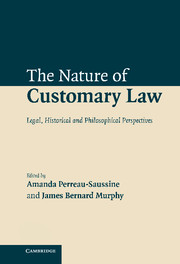Book contents
- Frontmatter
- Contents
- List of contributors
- Table of cases
- The character of customary law: an introduction
- Part I Custom and morality: natural law, customary law and ius gentium
- Part 2 Custom and law: custom, common law and customary international law
- 7 Custom in medieval law
- 8 Siege warfare in the Early Modern Age: a study on the customary laws of war
- 9 The idea of common law as custom
- 10 Three ways of writing a treatise on public international law: textbooks and the nature of customary international law
- 11 Custom, common law reasoning and the law of nations in the nineteenth century
- 12 Custom in international law: a normative practice account
- 13 Customary international law and the quest for global justice
- Index of names
9 - The idea of common law as custom
Published online by Cambridge University Press: 30 June 2009
- Frontmatter
- Contents
- List of contributors
- Table of cases
- The character of customary law: an introduction
- Part I Custom and morality: natural law, customary law and ius gentium
- Part 2 Custom and law: custom, common law and customary international law
- 7 Custom in medieval law
- 8 Siege warfare in the Early Modern Age: a study on the customary laws of war
- 9 The idea of common law as custom
- 10 Three ways of writing a treatise on public international law: textbooks and the nature of customary international law
- 11 Custom, common law reasoning and the law of nations in the nineteenth century
- 12 Custom in international law: a normative practice account
- 13 Customary international law and the quest for global justice
- Index of names
Summary
Some of the extreme opacity of the idea of custom seems to be owed to two considerations. One is that custom modifies the actors who observe it; a well-established custom is not merely a constraint external to a person's character, but has a tendency, with time, to constitute an aspect of his being. Another is that customary arrangements have typically involved an interaction between two overlapping groups of people: the community within which given customs are observed and a much smaller group perhaps most neutrally described as the custodians of such arrangements, a group who are in practice charged with the articulation of the customs, and therefore with their application and development. A link between these two considerations is that the very function of the custodians is likely to demand internalisation of methods, moral attitudes, and intellectual habits appropriate to the social norms that they articulate. At all events, these generalities were true of the pre-modern common lawyers. From the perspective of a book on custom, the interest of pre-Benthamite common law thinking lies in the tension it exhibited between its accounts of what the lawyers did – the patterns of thought and behaviour that might be said to constitute a trained professional – and its attempts to identify their esoteric practice with principles engendered by the wider population.
- Type
- Chapter
- Information
- The Nature of Customary LawLegal, Historical and Philosophical Perspectives, pp. 203 - 227Publisher: Cambridge University PressPrint publication year: 2007
- 4
- Cited by



